六年级下册英语常用表达法
pep六年级英语下册单词表及常用表达法

六年级英语下册单词表Unit 1.1.更年轻的2. 更年长的3. 更高的4. 更矮的;更短的5. 更长的6. 更瘦的7. 更重的8. 更大的9. 更小的10. 更强壮的11. dinosaur 12. hall 13. metre;meter 14. than 15. both 16. kilogram 17. countryside 18. lower 19. shadow 20. smarter 21. becomeUnit 21.打扫2. 停留3. 洗4. 看5. 患病;得病6. 感冒7. 睡觉8. 读9. 看见10. 最近的;上一个的11. 昨天12. 在...之前13. drank 14. show 15. magazine 16. better 17. faster 18. hotel 19. fixed 20. broken 21. lamp 22. loud 23. enjoy 24. stayUnit 31.去2. 野营3. (尤指在假日)野营4. 钓鱼;捕鱼5. 去钓鱼6. 骑(马;自行车)7. 受伤8. 吃9. 拍照10. 拍照(短语)11. 买12. 礼物13. fell 14. off 15. Labour Day 16. mule 17. Turpan 18. could 19. till 20. beach 21. basket 22. part 23. licked 24. laughedUnit 41.饭厅2. 草坪3. 体育馆4. 以前5. 骑自行车运动或活动6. 去骑自行车7. 滑冰8. 羽毛球运动9. star 10. easy 11. look up 12. Internet 13. different 14. active 15. race 16. nothing 17. thought 18. felt 19. cheetah 20. trip 21. woke 22. dream常用表达法Unit 11.那是这个厅里最高的恐龙。
人教版六年级英语下册第单元常用表达

人教版六年级英语下册第单元常用表达Unit 1: Welcome Back to School1. Good morning/afternoon/evening, everyone!2. How are you today?3. I'm fine, thank you. And you?4. I'm great, thanks.5. Welcome back to school!6. It's good to see you all again.7. Let's have a great semester/year together.8. Please take out your textbooks and notebooks.9. Open your books to page...10. Let's start the lesson.Unit 2: My School Day1. What time do you get up in the morning?2. I get up at...3. What do you do in the morning?4. I brush my teeth, wash my face, and get dressed.5. What time does school start?6. School starts at...7. What subjects do you have in the morning?8. We have English, Math, and Science.9. What do you have for lunch?10. I have rice, vegetables, and meat.Unit 3: My Friends1. Who is your best friend?2. My best friend is...3. What does your friend look like?4. He/She has...5. What does your friend like to do?6. He/She likes...7. Can you describe your friend's personality?8. He/She is...9. What do you and your friend do together?10. We like to...Unit 4: My Family1. How many people are there in your family?2. There are...people in my family.3. Who are they?4. They are my...5. What do your parents do?6. My mom/dad is a...7. Do you have any siblings?8. Yes, I have a brother/sister.9. What are they like?10. He/She is...。
六年级下册英语句型
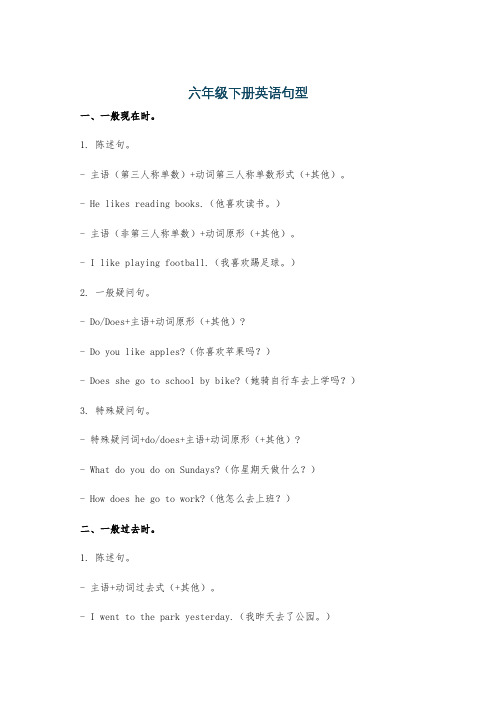
六年级下册英语句型一、一般现在时。
1. 陈述句。
- 主语(第三人称单数)+动词第三人称单数形式(+其他)。
- He likes reading books.(他喜欢读书。
)- 主语(非第三人称单数)+动词原形(+其他)。
- I like playing football.(我喜欢踢足球。
)2. 一般疑问句。
- Do/Does+主语+动词原形(+其他)?- Do you like apples?(你喜欢苹果吗?)- Does she go to school by bike?(她骑自行车去上学吗?)3. 特殊疑问句。
- 特殊疑问词+do/does+主语+动词原形(+其他)?- What do you do on Sundays?(你星期天做什么?)- How does he go to work?(他怎么去上班?)二、一般过去时。
1. 陈述句。
- 主语+动词过去式(+其他)。
- I went to the park yesterday.(我昨天去了公园。
)- He had a good time last week.(他上周过得很愉快。
)2. 一般疑问句。
- Did+主语+动词原形(+其他)?- Did you see him last night?(你昨晚看见他了吗?)3. 特殊疑问句。
- 特殊疑问词+did+主语+动词原形(+其他)?- Where did you go last weekend?(你上周末去哪里了?)三、There be句型。
1. 肯定句。
- There is/are+主语(+其他)。
- There is a book on the desk.(桌子上有一本书。
)- There are some trees in the park.(公园里有一些树。
)2. 否定句。
- There is/are+not+主语(+其他)。
- There isn't any water in the glass.(杯子里没有水。
英语六年级下册知识点公式
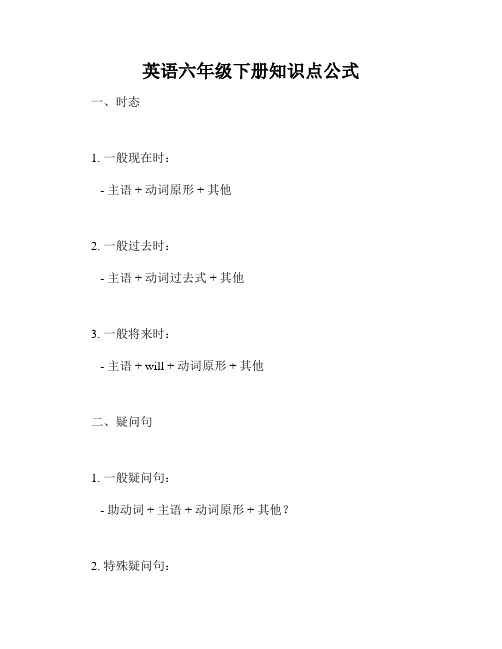
英语六年级下册知识点公式一、时态1. 一般现在时:- 主语 + 动词原形 + 其他2. 一般过去时:- 主语 + 动词过去式 + 其他3. 一般将来时:- 主语 + will + 动词原形 + 其他二、疑问句1. 一般疑问句:- 助动词 + 主语 + 动词原形 + 其他?2. 特殊疑问句:- 疑问词 + 助动词 + 主语 + 动词原形 + 其他?三、否定句1. 一般现在时否定句:- 主语 + do not/does not + 动词原形 + 其他2. 一般过去时否定句:- 主语 + did not + 动词原形 + 其他3. 一般将来时否定句:- 主语 + will not + 动词原形 + 其他四、被动语态1. 一般现在时被动语态:- 主语 + am/is/are + 被动语态动词 + 其他2. 一般过去时被动语态:- 主语 + was/were + 被动语态动词 + 其他3. 一般将来时被动语态:- 主语 + will be + 被动语态动词 + 其他五、比较级和最高级1. 比较级的构成:形容词/副词 + -er + than/and + 内容2. 最高级的构成:the + 最高级形式 + 内容六、连接词1. 并列连接词:- and, but, or2. 转折连接词:- however, although, though3. 递进连接词:- moreover, furthermore, in addition七、名词复数形式1. 一般名词复数形式:- 单数名词 + -s2. 以s, x, ch, sh结尾的名词复数形式: - 单数名词 + -es八、形容词比较级和最高级形式1. 一般形容词比较级:- 形容词 + -er + than2. 一般形容词最高级:- the + 形容词最高级形式九、动词过去式和过去分词形式1. 一般动词过去式:- 动词原形 + -ed2. 一般动词过去分词形式:- 动词原形 + -ed十、冠词1. 不定冠词:- a/an2. 定冠词:- the以上是英语六年级下册的一些重要知识点公式,通过这些公式的掌握,可以有效提高英语学习的效果。
(简化版)译林剑桥六年级下学期英语语法总结

(简化版)译林剑桥六年级下学期英语语法总结简化版译林剑桥六年级下学期英语语法总结一. Present Tense(一般现在时)1. 表示经常发生的动作或状态:- I go to school every day.- He likes playing soccer.2. 表示普遍真理、客观事实或固定安排:- The sun rises in the east.- The train arrives at 9 o'clock.3. 表示现阶段的情况或观点:- They are good friends.- My brother is a doctor.二. Past Tense(一般过去时)1. 表示过去发生的动作或状态:- We watched a movie yesterday.- She lived in London when she was young.2. 表示过去的惯或经常发生的动作:- We used to visit our grandparents every summer. - He always played piano after school.三. Future Tense(一般将来时)1. 表示将会发生的动作或情况:- I will go shopping tomorrow.- They will have a test next week.2. 表示计划、意图或预测:- She is going to travel to Europe next month.- It might rain tonight.四. Present Continuous Tense(现在进行时)1. 表示现阶段正在进行的动作:- We are studying English now.- They are playing basketball.2. 表示接近未来计划或正在发生但不一定是现阶段的动作:- I am leaving for vacation tomorrow.- He is always talking too much.五. Past Continuous Tense(过去进行时)1. 表示过去某个时间段内正在进行的动作:- They were watching TV when I called.- He was playing games all night yesterday.2. 表示过去某个时间点正在进行的动作被干扰:- She was cooking when the phone rang.- I was writing an email when the power went out.以上是本文的简化版译林剑桥六年级下学期英语语法总结,希望对你有帮助!。
英语六年级下册常用表达法连词成句
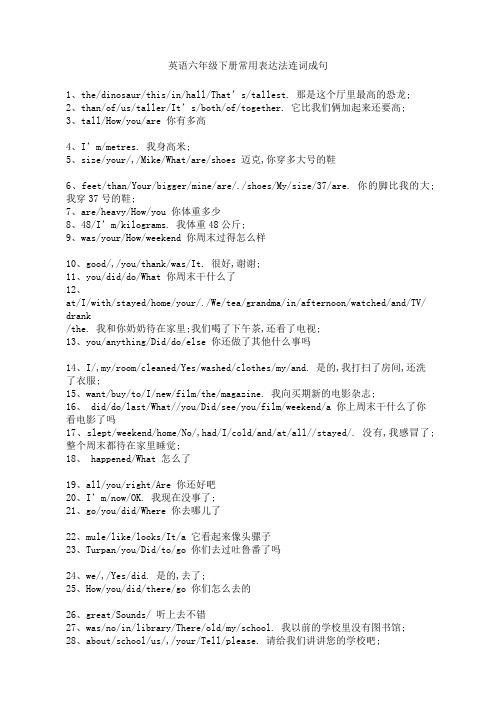
英语六年级下册常用表达法连词成句1、the/dinosaur/this/in/hall/That’s/tallest. 那是这个厅里最高的恐龙;2、than/of/us/taller/It’s/both/of/together. 它比我们俩加起来还要高;3、tall/How/you/are 你有多高4、I’m/metres. 我身高米;5、size/your/,/Mike/What/are/shoes 迈克,你穿多大号的鞋6、feet/than/Your/bigger/mine/are/./shoes/My/size/37/are. 你的脚比我的大;我穿37号的鞋;7、are/heavy/How/you 你体重多少8、48/I’m/kilograms. 我体重48公斤;9、was/your/How/weekend 你周末过得怎么样10、good/,/you/thank/was/It. 很好,谢谢;11、you/did/do/What 你周末干什么了12、at/I/with/stayed/home/your/./We/tea/grandma/in/afternoon/watched/and/TV/ drank/the. 我和你奶奶待在家里;我们喝了下午茶,还看了电视;13、you/anything/Did/do/else 你还做了其他什么事吗14、I/,my/room/cleaned/Yes/washed/clothes/my/and. 是的,我打扫了房间,还洗了衣服;15、want/buy/to/I/new/film/the/magazine. 我向买期新的电影杂志;16、 did/do/last/What//you/Did/see/you/film/weekend/a 你上周末干什么了你看电影了吗17、slept/weekend/home/No/,had/I/cold/and/at/all//stayed/. 没有,我感冒了;整个周末都待在家里睡觉;18、 happened/What 怎么了19、all/you/right/Are 你还好吧20、I’m/now/OK. 我现在没事了;21、go/you/did/Where 你去哪儿了22、mule/like/looks/It/a 它看起来像头骡子23、Turpan/you/Did/to/go 你们去过吐鲁番了吗24、we/,/Yes/did. 是的,去了;25、How/you/did/there/go 你们怎么去的26、great/Sounds/ 听上去不错27、was/no/in/library/There/old/my/school. 我以前的学校里没有图书馆;28、about/school/us/,/your/Tell/please. 请给我们讲讲您的学校吧;29、How/you/that/do/know 你是怎么知道的30、my/Internet/computers/were/There/no/or/in/time. 我那时候没有电脑也没有网络;31、was/,/,/Before/Now/I/I’m/quiet/in/active/class. 以前我很安静;现在我在课堂上很活跃;32、was/so/I/I/short,/ride/well/go/cycling/bike/my/,/Now/day/every. 我以前个子小,自行车骑得不好;现在我天天骑车;。
六年级下册英语常用句子表达法

六年级下册英语常用句子表达法1. 六年级下册英语一单元的常用表达发归还swim(过去式swam)游泳是自己书上打的;阅读go fishing 去钓鱼go hiking去郊游yesterday昨天study(过去式studied)学习tongue twister绕口令fil(过去式flew)飞return送回;朝park 公园go swimming 去游泳read(过去式read)读watch(过去式watched)看wash(过去式wsahed)洗clean(过去式cleaned)打扫play(过去式played)玩visit(过去式visited)看望do(过去式did)last 上一个weekend 周末cook(过去式cooked)做(饭)go(过去式went)去to 向2. 六年级下册英语句子表1.--- How tall are you?--- I'm 164 cm tall.2.You are shorter than me.3.You're 4 cm taller than me.4.--- How heavy are you?--- I'm 48 kg.5.I'm thinner than you,and shorter.6.--- What's the matter with you?--- My throat is sore./ My nose hurts.7.--- How do you feel?--- I feel sick.8.How are you,Liu Yun?You look so happy.9.How are you,Sarah?You look sad today.10.--- What did you do last weekend?--- I played football.11.--- Did you help them clean their room?--- Yes,I did.12.--- What did you do yesterday?--- I went fishing.3. 六年级下册新版英语所有句型——牛津版——第一单元:Who's taller than David? Gao Shan is. Whose school bag is heavier,yours or mine? Yours is, I think.第二单元:Do the boys jump higher than the girls? Yes, they do. Does Jim swim slower than David? No, he doesn't. He swims faster than David.第三单元:Excuse me, can you tell me the way to 。
六年级下册第一单元英语常用表达语
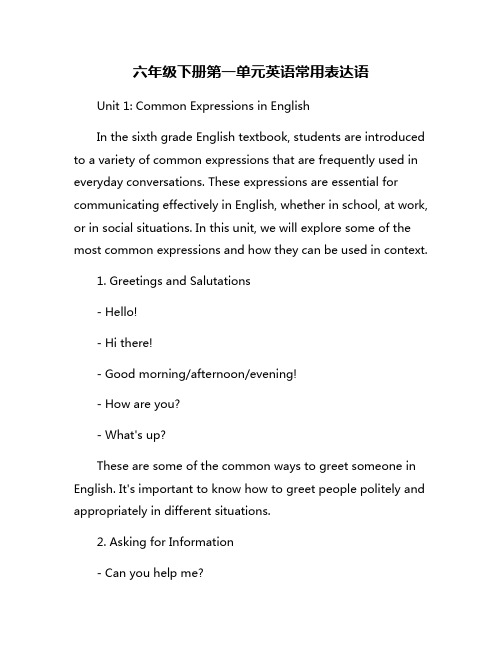
六年级下册第一单元英语常用表达语Unit 1: Common Expressions in EnglishIn the sixth grade English textbook, students are introduced to a variety of common expressions that are frequently used in everyday conversations. These expressions are essential for communicating effectively in English, whether in school, at work, or in social situations. In this unit, we will explore some of the most common expressions and how they can be used in context.1. Greetings and Salutations- Hello!- Hi there!- Good morning/afternoon/evening!- How are you?- What's up?These are some of the common ways to greet someone in English. It's important to know how to greet people politely and appropriately in different situations.2. Asking for Information- Can you help me?- What's your name?- Where are you from?- How old are you?- Do you speak English?These expressions are useful for asking for information and getting to know someone better. It's important to be able to ask questions in English in order to communicate effectively.3. Expressions of Politeness- Please- Thank you- Excuse me- I'm sorry- Pardon mePoliteness is key in English-speaking cultures, and using these expressions shows that you are considerate and respectful towards others.4. Expressing Emotions- I'm happy/sad/excited- I'm tired/hungry/thirsty- I'm bored/angry/scared- I'm feeling sickBeing able to express your emotions in English is important for communicating your feelings and needs to others.5. Asking for Help- Can you help me, please?- I don't understand.- Could you explain that again?- What does this mean?- Can you show me how to do this?It's important to be able to ask for help when you don't understand something or need assistance with a task.6. Making Requests- Can I have some water, please?- Could you lend me a pencil?- Would you mind turning down the volume?- Can you help me with my homework?- Could you pass me the salt, please?Making polite requests is important in English, and using these expressions will help you ask for what you need in a respectful way.By learning and practicing these common expressions, you will improve your English communication skills and be able to interact more effectively with others. Remember to use these expressions in a variety of contexts to become more confident and fluent in English. Keep practicing and using these expressions in your daily conversations to become a more proficient English speaker. Good luck!。
英语六年级下册常用表达法

英语六年级下册常用表达法1. May I go to the bathroom, please? (我可以去洗手间吗?)2. Can you help me, please? (你能帮我吗?)3. Excuse me, where is the library? (对不起,请问图书馆在哪里?)4. I'm sorry, I don't understand. (对不起,我不明白。
)5. What's your name? (你叫什么名字?)6. How old are you? (你多大了?)7. What is your favorite color? (你最喜欢的颜色是什么?)8. I'm sorry for being late. (对不起,我迟到了。
)9. Can you repeat that, please? (你能再说一遍吗?)10. Thank you very much. (非常感谢你。
)11. I don't know. (我不知道。
)12. Can you show me, please? (你能给我看一下吗?)13. What's the date today? (今天是几号?)14. Can I borrow your pencil, please? (我可以借你的铅笔吗?)15. How are you? (你好吗?)16. What time is it? (现在几点了?)17. Where do you live? (你住在哪里?)18. I'm sorry, I can't do it. (对不起,我做不了。
)19. Goodbye! (再见!)20. I'm glad to meet you. (很高兴见到你。
)。
六年级下册英语常用表达法
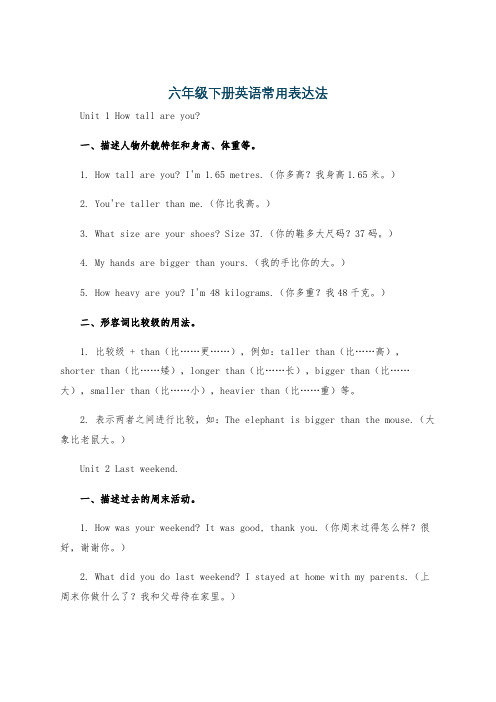
六年级下册英语常用表达法Unit 1 How tall are you?一、描述人物外貌特征和身高、体重等。
1. How tall are you? I'm 1.65 metres.(你多高?我身高1.65米。
)2. You're taller than me.(你比我高。
)3. What size are your shoes? Size 37.(你的鞋多大尺码?37码。
)4. My hands are bigger than yours.(我的手比你的大。
)5. How heavy are you? I'm 48 kilograms.(你多重?我48千克。
)二、形容词比较级的用法。
1. 比较级 + than(比……更……),例如:taller than(比……高),shorter than(比……矮),longer than(比……长),bigger than(比……大),smaller than(比……小),heavier than(比……重)等。
2. 表示两者之间进行比较,如:The elephant is bigger than the mouse.(大象比老鼠大。
)Unit 2 Last weekend.一、描述过去的周末活动。
1. How was your weekend? It was good, thank you.(你周末过得怎么样?很好,谢谢你。
)2. What did you do last weekend? I stayed at home with my parents.(上周末你做什么了?我和父母待在家里。
)3. Did you see a film? Yes, I did. / No, I didn't.(你看电影了吗?是的,我看了。
/ 不,我没看。
)4. I watched TV, too.(我也看了电视。
)二、一般过去时的用法。
六年级下册第4单元常用表达法
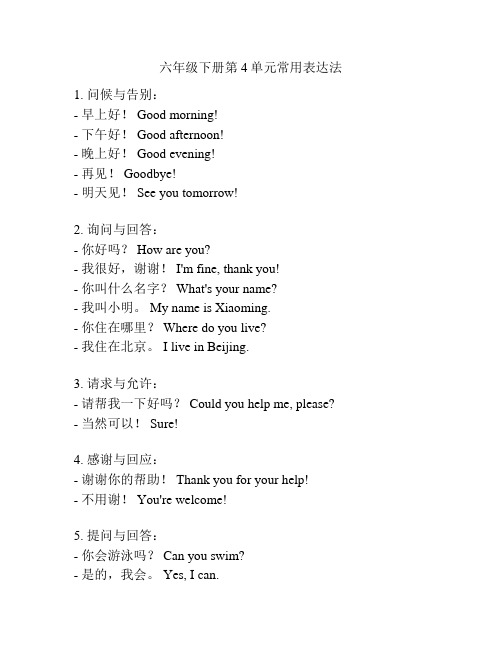
六年级下册第4单元常用表达法1. 问候与告别:- 早上好! Good morning!- 下午好! Good afternoon!- 晚上好! Good evening!- 再见! Goodbye!- 明天见! See you tomorrow!2. 询问与回答:- 你好吗? How are you?- 我很好,谢谢! I'm fine, thank you!- 你叫什么名字? What's your name?- 我叫小明。
My name is Xiaoming.- 你住在哪里? Where do you live?- 我住在北京。
I live in Beijing.3. 请求与允许:- 请帮我一下好吗? Could you help me, please? - 当然可以! Sure!4. 感谢与回应:- 谢谢你的帮助! Thank you for your help!- 不用谢! You're welcome!5. 提问与回答:- 你会游泳吗? Can you swim?- 是的,我会。
Yes, I can.- 你会跳舞吗? Can you dance?- 不,我不会。
No, I can't.6. 邀请与回应:- 你想和我一起玩吗? Do you want to play with me?- 好的,我很愿意。
Sure, I'd love to.7. 学习与交流:- 我不明白这个问题。
I don't understand this question.- 我可以向你请教吗? Can I ask you for help?- 当然可以! Sure!8. 道歉与原谅:- 对不起,我做错了。
I'm sorry, I made a mistake.- 没关系,我原谅你了。
It's okay, I forgive you.9. 引导与描述:- 如果...就... If..., then...- 我喜欢读书。
人教版 六年级英语 单词及常用表达法

六年级上册Unit1科学_____________________ 博物馆_____________________ 邮局_____________________ 书店_____________________ 电影院_____________________ 医院_____________________ 十字路口_____________________ 转弯_____________________ 左转_____________________ 笔直地_____________________ 右转_____________________ 问_____________________ 先生_____________________ 有趣的_____________________ 意大利的_____________________ 餐馆_____________________ 披萨饼_____________________ 街道_____________________ 到达_____________________ 定位系统_____________________ (give的过去式)_____________________ 特点_____________________ 跟着_____________________ 远_____________________ 告诉_____________________Unit2步行_____________________ 经,乘_____________________ 公共汽车_____________________ 飞机_____________________ 出租车_____________________ 大船_____________________ 地铁_____________________ 慢的_____________________ 减少;降低_____________________ 减速_____________________ 火车_____________________ 停,停车站_____________________ 夫人_____________________ 早到的_____________________ 头盔_____________________ 必须_____________________ 穿着_____________________注意_____________________ 注意_____________________ 交通_____________________ 交通信号灯_____________________ 慕尼黑(德国城市)_____________________ 德国_____________________ 阿拉斯加州(美国州名)_____________________ 快的_____________________ 轮渡_____________________ 雪橇_____________________ 帕帕韦斯特雷岛_____________________ 苏格兰_____________________ Unit3拜访_____________________ 电影_____________________ 看电影_____________________ 旅行_____________________ 去旅行_____________________ 超市_____________________ 晚上_____________________ 今晚_____________________ 明天_____________________ 下周_____________________ 词典_____________________ 滑稽的_____________________ 儿童连环画_____________________ 单词_____________________ 单词书_____________________ 明信片_____________________ 课_____________________ 太空_____________________ (尤指长途)旅行_____________________ 一半_____________________ 价格_____________________ 中秋节_____________________ 一起_____________________ 聚会_____________________ 月饼_____________________ 诗_____________________ 月亮_____________________Unit4(study的第三人称单数形式)学习_____________________谜_____________________ 远足_____________________ 笔友_____________________ 业余爱好_____________________ 茉莉_____________________ 想法;主意_____________________ 堪培拉(澳大利亚首都)_____________________ 令人惊奇的_____________________ 表示征求意见_____________________ 射门_____________________ 加入_____________________ 俱乐部_____________________ 分享_____________________ Unit5工厂_____________________ 工人_____________________ 邮递员_____________________ 商人;企业家_____________________ 警察_____________________ 渔民_____________________ 科学家_____________________ 飞行员_____________________ 教练_____________________ 国家_____________________ 校长_____________________ 大海_____________________ 保持_____________________ 大学_____________________ 体育馆_____________________ 如果_____________________ 记者_____________________ 使用_____________________ 打字_____________________ 迅速地_____________________ 秘书_____________________Unit6生气的_____________________ 害怕_____________________ 难过的_____________________ 担心的;发愁的_____________________ 高兴地_____________________ 看病_____________________ 穿_____________________更多的_____________________ 深的_____________________ 呼吸_____________________ 深深吸一口气_____________________ 数数_____________________ 数到十_____________________ 追赶_____________________ (mouse的复数)老鼠_____________________ 邪恶的;坏的_____________________ (使)受伤_____________________ 有病;不舒服_____________________ 有毛病_____________________ 应该_____________________ 觉得;感到_____________________ 健康;身体好_____________________ 坐_____________________ 草坪_____________________ 听见_____________________ 蚂蚁_____________________ 担心;担忧_____________________ 陷住;无法移动_____________________ 泥_____________________ 拉;拽_____________________ 每人_____________________六年级上册英语常用表达法Unit1 How can I get there?博物馆商店在哪里?__________________________________________ 在大门附近。
六年级英语下册语法知识点精选全文
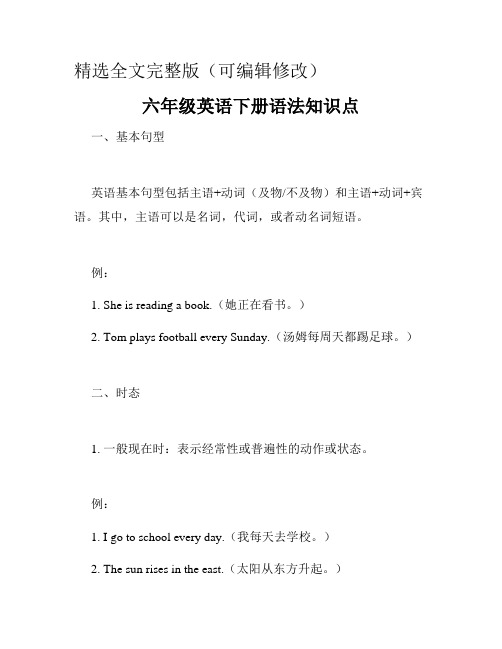
精选全文完整版(可编辑修改)六年级英语下册语法知识点一、基本句型英语基本句型包括主语+动词(及物/不及物)和主语+动词+宾语。
其中,主语可以是名词,代词,或者动名词短语。
例:1. She is reading a book.(她正在看书。
)2. Tom plays football every Sunday.(汤姆每周天都踢足球。
)二、时态1. 一般现在时:表示经常性或普遍性的动作或状态。
例:1. I go to school every day.(我每天去学校。
)2. The sun rises in the east.(太阳从东方升起。
)2. 现在进行时:表示现在正在进行的动作。
例:1. They are playing basketball in the park.(他们正在公园里打篮球。
)2. She is studying for the exam.(她正在为考试学习。
)3. 一般过去时:表示过去发生的动作或状态。
例:1. They visited their grandparents last week.(他们上周拜访了他们的祖父母。
)2. We lived in Paris for two years.(我们在巴黎住了两年。
)三、动词时态的转换动词时态可以通过时态的转换来表达过去、现在和将来的概念。
常见的时态转换有以下几种:1. 一般现在时转换为一般过去时:- am/is/are → was/were- do/does → did- have/has → had例:1. He is a teacher.(他是一名老师。
)→ He was a teacher.(他曾经是一名老师。
)2. They have a dog.(他们有一只狗。
)→ They had a dog.(他们曾经有一只狗。
)2. 一般现在时转换为一般将来时:将动词的原形后加上will。
例:1. She knows the answer.(她知道答案。
小升初英语必背短语(知识清单)-人教PEP版英语六年级下册
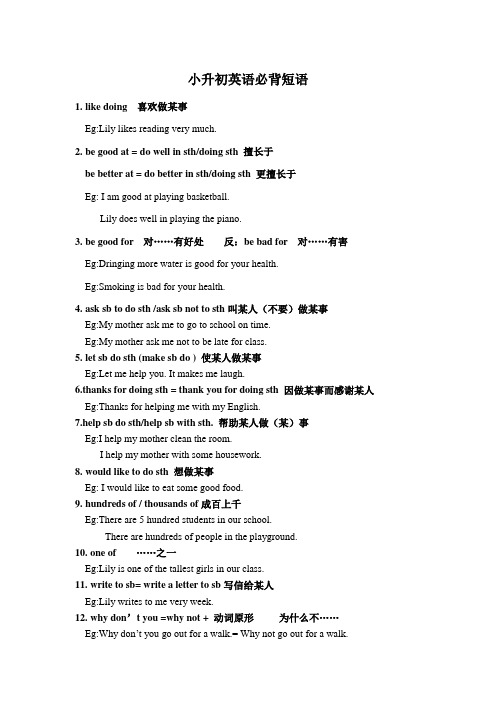
小升初英语必背短语1.like doing 喜欢做某事Eg:Lily likes reading very much.2.be good at = do well in sth/doing sth 擅长于be better at = do better in sth/doing sth 更擅长于Eg: I am good at playing basketball.Lily does well in playing the piano.3.be good for 对……有好处反:be bad for 对……有害Eg:Dringing more water is good for your health.Eg:Smoking is bad for your health.4.ask sb to do sth /ask sb not to sth叫某人(不要)做某事Eg:My mother ask me to go to school on time.Eg:My mother ask me not to be late for class.5.let sb do sth (make sb do ) 使某人做某事Eg:Let me help you. It makes me laugh.6.thanks for doing sth = thank you for doing sth 因做某事而感谢某人Eg:Thanks for helping me with my English.7.help sb do sth/help sb with sth. 帮助某人做(某)事Eg:I help my mother clean the room.I help my mother with some housework.8.would like to do sth 想做某事Eg: I would like to eat some good food.9.hundreds of / thousands of成百上千Eg:There are 5 hundred students in our school.There are hundreds of people in the playground.10.one of ……之一Eg:Lily is one of the tallest girls in our class.11.write to sb= write a letter to sb写信给某人Eg:Lily writes to me very week.12.why don’t you =why not + 动词原形为什么不……Eg:Why don’t you go out for a walk.= Why not go out for a walk.13.something important 一些重要的事情不定代词+形容词14.it’s time to do sth= it’s time for sth.是时候做某事了Eg:It’s time to have lunch.= It’s time for lunch.15.be like问性格,look like 问外貌be like 范围更大一些,有时候既问性格也问外貌Eg:What's your sister like? 你姐姐怎么样?/你姐姐是怎样一个人?She is kind. 她很善良。
六年级下册英语常用表达法二单元

六年级下册英语常用表达法二单元一、问候语1. Good morning/afternoon/evening! 早上/下午/晚上好!2. Hi! / Hello! 嗨!/你好!3. How are you? 你好吗?4. Nice to meet you! 很高兴见到你!二、介绍自己1. My name is… 我的名字是……2. I am from… 我来自……3. I am in Class… 我在……班。
4. I am ten years old. 我十岁了。
三、询问他人信息1. What’s your name? 你叫什么名字?2. How old are you? 你几岁了?3. Where are you from? 你来自哪里?4. What class are you in? 你在哪个班级?5. What’s your favorite color/food/subject? 你最喜欢的颜色/食物/科目是什么?四、表达谢意1. Thank you. 谢谢。
2. Thanks a lot. 非常感谢。
3. You’re welcome. 不用谢。
4. That’s very kind of you. 你真好。
五、请求帮助1. Can you help me? 你能帮我吗?2. Could you please…? 你能……吗?3. Would you mind…? 你介意……吗?4. Excuse me, can you tell me…? 对不起,请问你能告诉我……吗?六、表达喜欢1. I like… 我喜欢……2. I love… 我爱……3. That’s great! 太好了!4. It’s my favorite. 这是我最喜欢的。
七、表达不满1. I don’t like… 我不喜欢……2. I hate… 我讨厌……3. That’s not fair! 这不公平!4. It’s boring. 这太无聊了。
六年级下册英语必考知识点
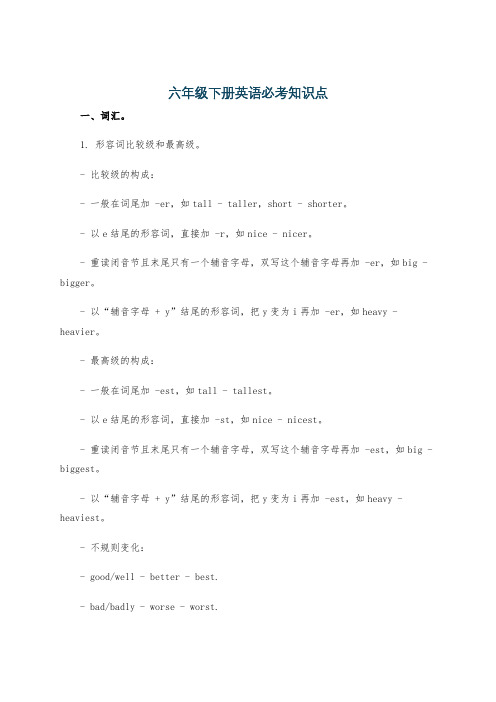
六年级下册英语必考知识点一、词汇。
1. 形容词比较级和最高级。
- 比较级的构成:- 一般在词尾加 -er,如tall - taller,short - shorter。
- 以e结尾的形容词,直接加 -r,如nice - nicer。
- 重读闭音节且末尾只有一个辅音字母,双写这个辅音字母再加 -er,如big - bigger。
- 以“辅音字母 + y”结尾的形容词,把y变为i再加 -er,如heavy - heavier。
- 最高级的构成:- 一般在词尾加 -est,如tall - tallest。
- 以e结尾的形容词,直接加 -st,如nice - nicest。
- 重读闭音节且末尾只有一个辅音字母,双写这个辅音字母再加 -est,如big - biggest。
- 以“辅音字母 + y”结尾的形容词,把y变为i再加 -est,如heavy - heaviest。
- 不规则变化:- good/well - better - best.- bad/badly - worse - worst.- many/much - more - most.- little - less - least.2. 动词的过去式。
- 规则变化:- 一般在词尾加 -ed,如play - played,clean - cleaned。
- 以e结尾的动词,加 -d,如live - lived。
- 重读闭音节且末尾只有一个辅音字母,双写这个辅音字母再加 -ed,如stop - stopped。
- 以“辅音字母 + y”结尾的动词,把y变为i再加 -ed,如study - studied。
- 不规则变化:- go - went.- see - saw.- eat - ate.- have/has - had等。
3. 重点单词。
- 职业类:doctor(医生),teacher(教师),pilot(飞行员),scientist (科学家),artist(艺术家)等。
广州版小学英语六年级下短语、句型汇总

广州版小学英语六年级下短语、句型汇总2.look forward to - 期待2.look forward to - 期待2.look forward to - 期待2.look forward to - 期待2.look forward to - 期待2.look forward to - 期待2.look forward to - 期待2.look forward to - 期待2.look forward to - 期待3.take care of - 照顾3.take care of - 照顾3.take care of - 照顾3.take care of - 照顾3.take care of - 照顾3.take care of - 照顾3.take care of - 照顾3.take care of - 照顾3.take care of - 照顾4.let me see - 让我看看4.let me see - 让我看看4.let me see - 让我看看4.let me see - 让我看看4.let me see - 让我看看4.let me see - 让我看看4.let me see - 让我看看4.let me see - 让我看看4.let me see - 让我看看e on - 来吧e on - 来吧e on - 来吧e on - 来吧e on - 来吧e on - 来吧e on - 来吧e on - 来吧e on - 来吧6.in the middle of - 在。
的过程中6.in the middle of - 在。
的过程中6.in the middle of - 在。
的过程中6.in the middle of - 在。
的过程中6.in the middle of - 在。
的过程中6.in the middle of - 在。
的过程中6.in the middle of - 在。
小学英语六年级下册重点句型汇总
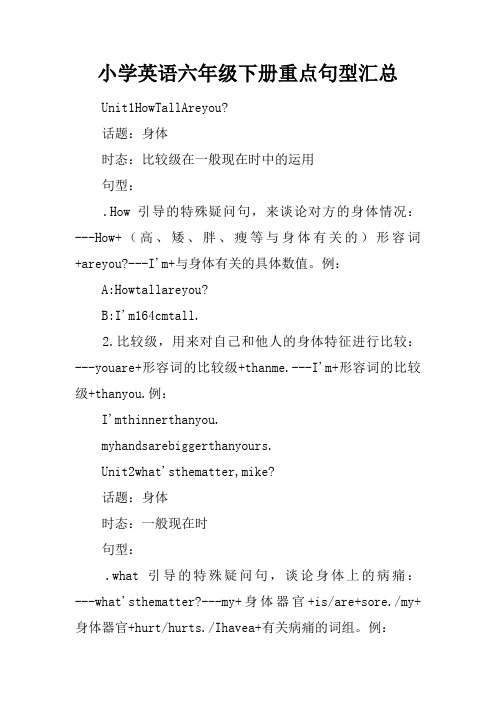
小学英语六年级下册重点句型汇总Unit1HowTallAreyou?话题:身体时态:比较级在一般现在时中的运用句型:.How引导的特殊疑问句,来谈论对方的身体情况:---How+(高、矮、胖、瘦等与身体有关的)形容词+areyou?---I'm+与身体有关的具体数值。
例:A:Howtallareyou?B:I'm164cmtall.2.比较级,用来对自己和他人的身体特征进行比较:---youare+形容词的比较级+thanme.---I'm+形容词的比较级+thanyou.例:I'mthinnerthanyou.myhandsarebiggerthanyours.Unit2what'sthematter,mike?话题:身体时态:一般现在时句型:.what引导的特殊疑问句,谈论身体上的病痛:---what'sthematter?---my+身体器官+is/are+sore./my+身体器官+hurt/hurts./Ihavea+有关病痛的词组。
例:A:what'sthematter,Amy?B:Ihaveacold.mynosehurts.2.How引导的特殊疑问句,谈论人们情绪上的感受:---Howareyou?youlook+与情绪有关的形容词。
---I'm+形容词。
例:A:Howareyou,Liuyun?youlooksohappy.B:yes.I'mexcited.Unit3Lastweekend话题:日常活动时态:一般过去时句型:.what引导的特殊疑问句,就过去已经发生的行为动作进行提问:---whatdidyoudo+时间?---I+动作(did).例:A:whatdidyoudolastweekend?B:IPlayedfootball.2.Did引导的一般疑问句,就过去是否发生了某行为动作进行问答:---Didyou+动词原形?---yes,Idid.No,Ididn't.例:A:Didyoureadbooks?B:yes,Idid.Unit4myHoliday话题:节日时态:一般过去时句型:综合运用where,when,what,How等词,引导特殊疑问句,就过去已经发生的行为动作进行提问:基本句型同上。
六年级下册英语常用表达法

六年级下册英语常用表达法六年级下册英语常用表达法Unit 1 How tall are you?1、That’s the tallest dinosaur in this hall . 那是这个厅里最高的恐龙。
2、It’s taller than both of us together . 它比我们俩加起来还高。
3、---How tall are you ? 你有多高?---I’m 1.65 metres. 我身高1.65 米。
4、---What size are your shoes , Mike ? 迈克,你穿多大号的鞋?---Your feet are bigger than mine. My shoes are size 37. 你的脚比我的大。
我穿37号的鞋。
5、---How heavy are you ? 你体重多少?---I’m 48 kilograms. 我体重48公斤。
Unit 2 Last weekend1、---How was your weekend ? 你周末过得怎么样?--- It was good, thank you. 很好,谢谢。
2、---What did you do ? 你(周末)干什么了?---I stayed at home with your grandma. We drank tea in the afternoon and watched TV我和你奶奶待在家里。
我们喝了下午茶,还看了电视。
3、---Did you do anything else ? 你还做了其他什么事吗?---Yes, I cleaned my room and washed my clothes. 是的,我打扫了房间,还洗了衣服。
4、I want to buy the new film magazine. 我想买期新的电影杂志。
5、---What did you do last weekend ? Did you see a film?你上周末干什么了?你看电影了吗?---No, I had a cold. I stayed at home all weekend and slept.没有,我感冒了。
- 1、下载文档前请自行甄别文档内容的完整性,平台不提供额外的编辑、内容补充、找答案等附加服务。
- 2、"仅部分预览"的文档,不可在线预览部分如存在完整性等问题,可反馈申请退款(可完整预览的文档不适用该条件!)。
- 3、如文档侵犯您的权益,请联系客服反馈,我们会尽快为您处理(人工客服工作时间:9:00-18:30)。
六年级英语下册常用表达法
UNIT 1
1.T hat’s the tallest dinosaur in this hall.
那是这个厅里最高的恐龙。
It’s taller than both of us together.
它比我俩加起来还高。
2.How tall are you?
你有多高?
I’m 1.65 metres.
我身高1.65米。
3.What size are your shoes,Mike?
迈克,你穿多大号的鞋?
4.Your feet are bigger than mine. My shoes are size 37.
你的脚比我大,我穿37号鞋。
5.How heavy are you?
你体重多少?
I’m 48 kilograms.
我体重48公斤。
UNIT 2
6.How was your weekend?
你周末过得怎样?
It was good , thank you.
很好,谢谢。
7.What did you do?
你周末干什么了?
I stayed at home with your grandma.
We drank tea in the afternoon and watched TV.
我和奶奶呆在家里。
我们喝了下午茶,还看了电视。
8.Did you do anything else?
你还做了其他什么事吗?
Yes, I cleaned my room and washed my clothes.
是的,我打扫了房间还洗了我的衣服。
9.I want to buy the new film magazine.
我想买期新的电影杂志。
10.What did you do last weekend?
Did you see a film?
你上个周末干什么了?你看电影了吗?
No, I had a cold. I stayed at home all weekend and slept.
没有,我感冒了。
我整个周末都呆在家里睡觉。
11.What happened?
怎么了?
12.Are you all right?
你还好吗?
I’m OK now.
我现在没事了.
13.Where did you go?
你去哪里了?
14.It looks like a mule!
它看起来像头骡子。
15.Did you go to Turpan?
你们去吐鲁番了吗?
Yes,we did.
是的,去了。
16.How did you go there?
你们怎么去的?
We went there by plane.
我们坐飞机去的。
17.Sounds great.
听上去不错。
18.There was no library in my old school.
我以前的学校里没有图书馆。
19.Tell us about your school, please.
请给我们讲讲你的学校吧。
20.How do you know that?
你怎么知道的?
21.There were no computers or Internet in my time.
我那时候没有电脑也没有网络。
22.Before, I was quiet. Now, I’m very active in class.
以前我很安静。
现在我在课堂上很活跃。
23.I was short, so I couldn’t ride my bike well. Now,
I go cycling every day.
我以前个子小,自行车骑得不好。
现在我天天骑车。
Proverbs
Less is more.
少即是多。
All work and no play makes Jack a dull boy.
只工作不玩耍,聪明杰克也变傻。
All’s well that ends well.
结果好,一切都好。
Life is what you make it.
生活是自己创造出来的。
